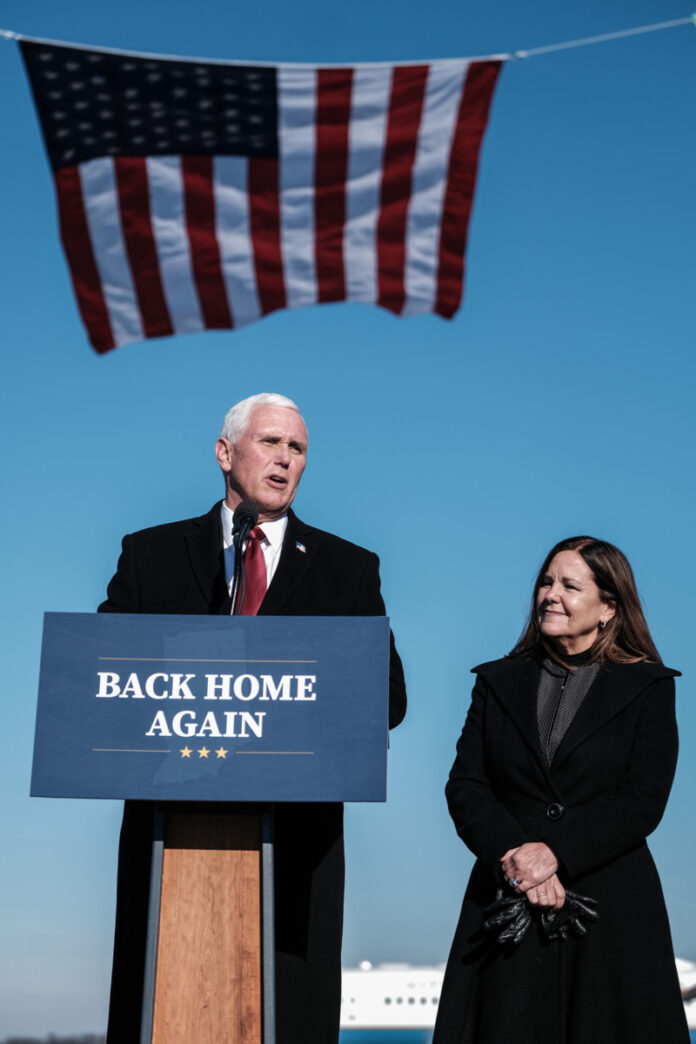
COLUMBUS, Ind. — As former Vice President Mike Pence returns to civilian life, the rough drafts of history are already being written on the Columbus native’s whirlwind four years in the Trump administration as speculation grows on what the future may have in store.
While opinions differ on what Pence’s most lasting legacy will be, near the top of the list will likely be his decision to defy former President Donald Trump’s repeated attempts to pressure him to use powers he did not have to decertify Electoral College votes during a joint session of Congress on Jan. 6.
Trump had falsely claimed on numerous occasions that Pence, who presided over the joint session, had unilateral authority to determine which electoral votes should be counted.
Neither the Constitution nor congressional statute grants the vice president any such powers, according to wire reports. It is up to the House and Senate to voice objections, and states’ electors were chosen in accordance with state law, not fraudulently.
During the session on Jan. 6, a violent mob of Trump supporters forced their way into the Capitol in a failed attempt to halt the certification of President Joe Biden’s victory in the 2020 presidential election, resulting in five deaths. Some of the pro-Trump protesters were heard yelling “Hang Mike Pence” during the riot and a gallows had been set up outside the Capitol by protestors.
“His legacy will be defined by what happened in January,” said Leslie Lenkowsky, an emeritus professor at the Indiana University’s O’Neill School of Public and Environmental Affairs who has known Pence since the 1990s. “…Lots of people felt he had been too accommodating to some of the things that the Trump administration did, but he certainly stood up when it really counted.”
Pence, 61, who has described himself as “a Christian, a conservative, and a Republican, in that order,” joined Trump’s campaign ticket in July 2016, forming a political odd couple of sorts with a president who would go on to shatter centuries-old norms and traditions while dominating the national discourse like no one before.
In 2017, Pence told The Republic that he and Trump were “different men” with “different life experiences” but had “become good friends.”
However, by 2021, a significant rift occurred between the two after Pence stood by his Constitutional duty after the insurrection, and the The Associated Press reported the two men didn’t speak for days.
As that occurred, Pence assumed a more presidential role in the administration, receiving a briefing at the Federal Emergency Management Agency headquarters in Washington from the FBI and other agencies on inauguration security and stopping by to thank White House phone operators, giving them a framed letter of appreciation. Later, he greeted members of the National Guard now protecting the Capitol building from further attack.
Pence was also the one who coordinated with lawmakers and the D.C. National Guard while the Capitol was under siege and he was in hiding. He also called the family of slain Capitol Police officer Brian Sicknick, who died from injuries in the attack.
He then traveled to thank the troops — first flying to Lemoore, California, to deliver remarks to sailors, and then to Fort Drum, New York, to speak before 10th Mountain Division soldiers, many of whom recently returned from Afghanistan.
Pence eventually had a conversation with Trump in the Oval Office, restoring their communication, according to wire reports.
Before the inauguration, Pence also called Vice President-Elect Kamala Harris to congratulate her and then attended the Jan. 20 inauguration with his wife Karen. Harris and her husband escorted Pence to a waiting vehicle at the Capitol after the inauguration to say farewell.
Joining the ticket
Before becoming Trump’s running mate, Pence was facing what looked to be a tight race in his bid for re-election as Indiana governor. In 2012, Pence narrowly defeated former Speaker of the Indiana House of Representatives John R. Gregg by just over 75,400 votes to become Indiana’s 50th governor.
“I think the two things that affected his decision to run for vice president … were not that he wanted to avoid a losing race — because I don’t think it was a foregone conclusion that he would lose — but rather the evangelical community and to represent that group on the national ticket,” Lenkowsky said.
For Trump’s team, Pence added value to the ticket because he could make in-roads with the evangelical community, particularly in the Midwest, said Lenkowsky, who cautioned that he doesn’t know all the inside facts into either camp’s decision-making process.
Pence was well-regarded by evangelical Christians, particularly after signing a law in Indiana that critics said would allow businesses to deny service to gay people based on business owner’s religious beliefs.
“Donald Trump exuded New York and lots of other things,” Lenkowsky said. “Mike was Midwest, and I think on some level (the Trump) campaign felt they needed to have that on the ticket.”
On Wednesday, Pence’s last official act as vice president was attending President Joe Biden’s inauguration, which Trump skipped and flew to his golf resort in Florida.
After departing Washington, Pence’s first stop was Columbus Municipal Airport, where he and his wife, Karen, were welcomed by a crowd lthat included friends and local and state officials, as well as family members such as his brother, Rep. Greg Pence, R-Ind. Well-wishers lined the airport fence at the event.
“Serving as your vice president was the greatest honor of our life, but now that that season of service has come to an end, we just had to come home,” he told the crowd as he stood beside his family, behind a sign on the credenza that said “Back Home Again.”
It is not clear if he plans to reside in Columbus after leaving office. However, he did say that he has promised his wife that they are moving back to Indiana in the summer.
The next move
Over the past several weeks, media outlets around the world have been speculating on Pence’s next move, ranging from running for president in 2024 or 2028 to launching a second iteration of the Mike Pence Show, a popular conservative talk show hosted by Pence during the 1990s.
The former vice president has been mum on his future plans and none of the local, state or federal officials contacted said they had any insight.
In a statement to The Republic, Sen. Todd Young, R-Indiana, characterized Pence’s leadership over the past four years as “calm” and “steady” and offered the departing vice president his best wishes with “whatever the future may hold.”
Kyle Hupfer, chairman of the Indiana Republican Party, said Pence is viewed as a “steady, conservative, principled leader,” but declined to comment on what he thinks the former vice president’s future will hold.
“I’m going to let the vice president and Karen speak for themselves,” Hupfer said. “I’m sure they will give their future a lot of thoughtful prayer and consultation with their family and that they’ll make a decision on how best to move forward. I don’t like to speculate on those things.”
Pence is not the only vice president who served under a president who lost a re-election bid.
The two most recent examples are Walter Mondale, a Democrat who served under President Jimmy Carter, and Dan Quayle, a Republican from Indiana who served under President George H.W. Bush.
Both Mondale and Quayle made runs at the presidency but neither reached the White House.
After President Ronald Reagan defeated Carter in the 1980 presidential election, Mondale practiced law briefly before returning to politics, securing the 1984 Democratic Party presidential nomination.
However, Mondale was defeated by Reagan in a landslide in the 1984 general election, losing the Electoral College 525-13.
Quayle took a different path post vice presidency, writing three books and weighing a run for Indiana governor in 1996 before launching an unsuccessful bid for the 2000 Republican Party presidential nomination.
Pence, on the other hand, already served as Indiana governor from 2013 to 2017. He also spent six terms in the U.S. House of Representatives from 2001 to 2013, a seat his brother currently holds.
“I doubt very much whether Mike Pence is going to run for another elected office other than president, but he will do the variety of things you need to do to remain active within the Republican Party,” Lenkowsky said. “I would really be looking eight years out to see his next move.”
Lenkowsky said he would expect Pence to “get heavily involved” in campaigning for Republican congressional candidates in 2022.
Local reaction
Bartholomew County Republican Party chair Barb Hackman, who has gotten to know Pence during her eight-year tenure leading the local party, said she hasn’t heard about any plans the former vice president has.
“We’ll just have to wait and see,” Hackman said.
Indiana Rep. Ryan Lauer, R-Columbus, said the former vice president has been a “source of stability” over the past four years and during his six terms in Congress.
Whatever Pence decides to pursue in the future, Lauer said, “I think he’d be very successful.”
“In the current political climate, I think a lot of people are looking for leaders like Mike Pence to bring us together as a country again,” Lauer said.
While several national polls since the Jan. 6 Capitol riot, including a recent Reuters Ipsos Poll, show Trump’s approval rating among self-identified Republicans dropping, Lenkowsky said he does not expect Pence to distance himself from Trump in “any overt way.”
Instead, Pence will likely focus on “the kinds of people who supported Trump, not the extremists, but the rank-and-file Republicans, particularly evangelical Republicans.”
Rep. Greg Pence, for his part, praised his brother for actions and policies that evangelical voters may find appealing, including his stance on abortion and his military and economic policies.
“My brother, Vice President Pence, worked tirelessly to put America first,” Rep. Greg Pence said in a statement. “…The Trump-Pence Administration is also one of the most pro-life administrations in recent history and I am proud of the dedication my brother puts forward in fighting for the sanctity of human life.”
“It is an honor to call him my brother,” he wrote.
Thanking Trump
At his homecoming event Wednesday in Columbus, the former vice president thanked Donald and Melania Trump “for all they have done to make America great again.”
Another significant part of what Pence’s legacy will be is how the Trump administration’s response to the COVID-19 pandemic is remembered, which the former president tapped Pence to lead.
The response, like just about everything with the Trump administration, will likely will be polarizing.
While the coronavirus would almost certainly have posed a grave crisis for any president given its rapid spread and power to kill, Trump seemed to invest as much in battling public perceptions as he did in fighting the virus itself, repeatedly downplaying the threat and rejecting scientific expertise while fanning conflicts ignited by the outbreak, according to wire reports.
As Trump and Pence left office this past week, the U.S. eclipsed 400,000 deaths, accounting for nearly 1 of every 5 virus deaths reported worldwide — far more than any other country despite its great wealth and medical resources.
The 400,000-death toll, reported Tuesday by Johns Hopkins University, is greater than the population of New Orleans, Cleveland or Tampa, Florida. It’s nearly equal to the number of American lives lost annually to strokes, Alzheimer’s disease, diabetes, flu and pneumonia combined, according to wire reports.
Republican officials at the local, state and federal levels praised Pence’s role as chair of the White House’s coronavirus task force, calling it “another keystone legacy for the vice president.”
While many people expect Pence to make a run for the presidency in 2024, there’s no need to rush into things, Lenkowsky said.
Pence is 17 years younger than President Joe Biden and, in 2028, will still be one year younger than Trump when he took office in 2017.
“Most people don’t realize that by contemporary standards, he is still a very young man,” Lenkowsky said. “If 2024 doesn’t look like a good time for him to run for president, he is still, in 2028, younger not only than the man who was just inaugurated, but also the man he just finished serving as vice president.”
“The question he’ll have to deal with is how does he keep himself politically relevant going forward?”




